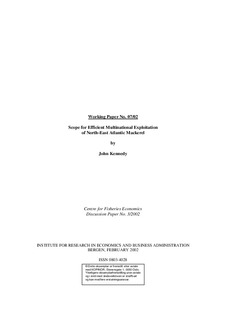| dc.contributor.author | Kennedy, John | |
| dc.date.accessioned | 2006-07-19T19:29:10Z | |
| dc.date.available | 2006-07-19T19:29:10Z | |
| dc.date.issued | 2002-02 | |
| dc.identifier.issn | 1503-2140 | |
| dc.identifier.uri | http://hdl.handle.net/11250/165794 | |
| dc.description.abstract | The three major harvesters of North-East Atlantic mackerel, Norway, the EU (Scotland and the Irish Republic) and Russia, are modelled as exercising alternative cooperative strategies. Incentives for the formation of coalitions of harvesters are analysed by finding the annual catches of each harvester over 30 years that maximise the present value of coalition rents under all possible coalition arrangements. The bioeconomic model is age-structured. Prices of mackerel are catch-dependent. Sensitivity analysis is conducted on key parameters: the stock and effort exponents in the harvest function; the rate of discount; and the planning horizon. The main result is that, for a wide range of parameter values, the grand coalition is unstable if joint rents cannot be redistributed amongst the players. Without transfers, the outcome is the type of non-cooperative fishing currently observed. However, if transfers are feasible, transfers can be found for the mackerel fishery to sustain the efficiency gains of joint maximisation, based on Shapley values. | en |
| dc.format.extent | 245915 bytes | |
| dc.format.mimetype | application/pdf | |
| dc.language.iso | eng | en |
| dc.publisher | SNF/Centre for Fisheries Economics | en |
| dc.relation.ispartofseries | Working Paper | en |
| dc.relation.ispartofseries | 2002:7 | en |
| dc.relation.ispartofseries | Discussion Paper | en |
| dc.relation.ispartofseries | 2002:3 | en |
| dc.title | Scope for efficient multinational exploitation of North-East Atlantic mackerel | en |
| dc.type | Working paper | en |
| dc.type | Working paper | en |
